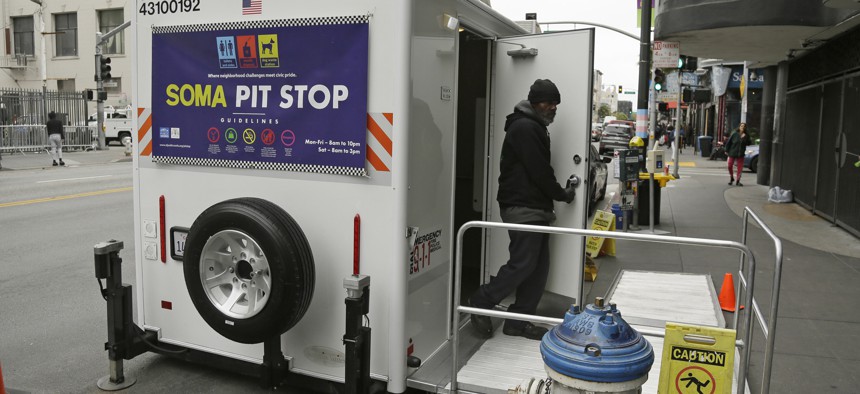City Will Try Keeping Public Toilets Open Overnight to Help Curb Poop Problems

An attendant exits a "Pit Stop" public toilet on Sixth Street in San Francisco. AP Photo/Eric Risberg
San Francisco will launch the pilot program next week.
San Francisco will soon offer three 24-hour public toilet facilities, with attendants, in response to concerns about people having to relieve themselves on city streets and sidewalks.
The city already has 25 “Pit Stop” public restrooms located across 13 neighborhoods as part of a program that began about five years ago. But none of the restrooms are open overnight.
Under a new pilot initiative the city will keep toilets in the Tenderloin, South of Market, and Castro neighborhoods open 24 hours a day, beginning Monday through the end of November.
The program is expected to cost about $300,000, a San Francisco Public Works spokesperson said by email.
Supervisor Matt Haney said in a statement that the No. 1 reason people call the city’s 311 phone line is to report feces in public places and that these complaints are concentrated in and around the Tenderloin and South of Market, which are both part of his district.
As Route Fifty reported earlier this year, San Francisco, a national epicenter for the tech sector and the wealth that goes with it, has been grappling with how to deal with problematic amounts of human feces on its streets, an issue tied to the city’s sizable homeless population.
Haney, who was elected last year, has been pushing a 10-point plan focused on street cleanliness. Part of it calls for expanding public bathroom access. Of the total Pit Stop pilot program cost, $200,000 will pay for the restrooms in Haney’s district, according to his office.
“Access to public restrooms should be a fundamental right in San Francisco,” he said.
“Public bathrooms, open and accessible, when people need them are an essential part of urban life,” Haney added. “People's need to use a toilet does not end at 6pm, and neither should bathroom access."
Previously on Route Fifty:
Bill Lucia is a Senior Reporter for Route Fifty and is based in Olympia, Washington.
NEXT STORY: Should emergency alerts be issued through Netflix and Pandora?






